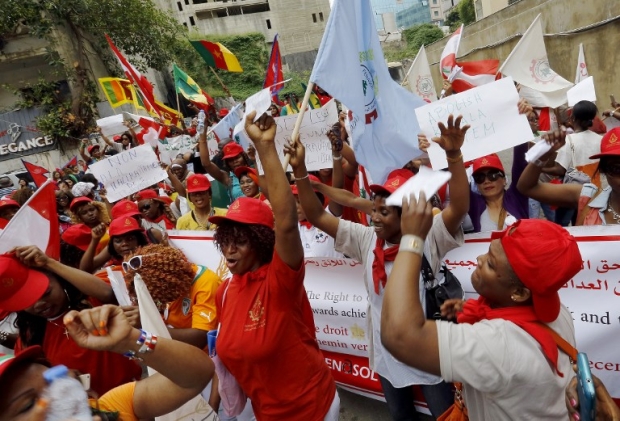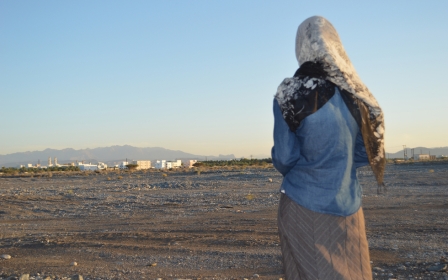The Arab world needs to admit it's racist

Racism is a problem in the Arab world, yet too many people in the region deny it. Last week, an Ethiopian domestic worker fell from the balcony of her employer’s home in Kuwait. It was caught on camera, and though the woman survived, she later revealed that her employer was trying to kill her.
"The lady put me in the bathroom and was about to kill me in the bathroom without anybody finding out," the worker said.
"She would have thrown my body out like rubbish, so instead of staying there I went to save myself and then I fell."
This isn’t an isolated incident. Many Arab countries have maintained the kafala – or sponsorship system – which ties the legal status of low-wage migrant workers directly to their employer, giving the latter power to take away workers’ passports, withhold their salaries, and subject them to harrowing abuse.
In Arab countries where kafala isn’t applied, refugees and non-Western migrants are routinely abused by the state, their host community, and even aid organisations that were founded to help them.
The irony is disturbing. In a world where Muslims and Arabs have long been subjected to racism and imperial conquest, too many Arab societies have failed to consider how they treat the most vulnerable migrants living among them.
And here lies the most obvious paradox: how can a society defeat racism when they perpetuate it themselves?
A worker, not a slave
Last year, the US State Department’s Trafficking in Person’s report listed six Arab States on their watch list. Each country on the list apart from Lebanon is a member of the Gulf Cooporation Council (GCC). The kafala system, however, is something they all have in common.
The International Trade Union Confederation estimates that more than 4,000 low wage workers will die while building infrastructure for Qatar’s 2022 FIFA World Cup
In places, such as Qatar and Kuwait, more than 90 percent of the labour force is imported from South and Southeast Asia and Africa. Most workers elect to migrate to these countries since it remains one of few viable options to support their families back home.
Recruiters do their part to lure workers by propagating false promises of a fair wage and a day off each week. It’s not until many workers arrive that they realise they’ve been trafficked into performing slave-like labour which they would have never consented to.
The International Trade Union Confederation estimates that more than 4,000 low wage workers will die while building infrastructure for Qatar’s 2022 FIFA World Cup.
Qatari officials have refused to own up and have instead accused rights groups of spreading "negative publicity" about their country. This rebuttal is as ridiculous as it is self-centred. If Qataris are that concerned with their image in the global arena, then they should abolish a system that functions to enslave people.
Dying to escape
Domestic migrant workers – generally women – are even more vulnerable. In Lebanon, they are excluded from basic protections under the labour law. And like elsewhere in the region, many are locked indoors and routinely subjected to starvation, rape and death. The female head of the household is sometimes the perpetrator, or in the very least, complicit in the abuse.
In 2008, Human Rights Watch found that at least one domestic migrant worker in Lebanon was dying each week as a result of "unnatural causes" such as alleged suicide or after suspiciously falling from tall buildings. Activists suspect that the rate of deaths remains just as high today.
Politicians never seem to take the mistreatment of migrant workers seriously enough. Former Lebanese labour minister Sejaan Azzi went so far as to say that abuse against domestic workers was "‘exaggerated" despite mounting evidence to the contrary.
Local rights groups have nonetheless lobbied tirelessly in support of migrant workers, yet large segments of Lebanese society continue to normalise racism.
It’s no secret, for instance, that domestic workers from Africa and South Asia are typically the cheapest to recruit. Filipino workers are at the top of the racial hierarchy because of their lighter skin. While their wages are also abysmal, they generally receive more money.
This logic is terrifying. Geara’s argument has been reused by generations of misogynist men to subjugate women. And now Arab women like her, who have been excluded from white mainstream feminism, are failing to defend those trapped in the kafala system.
Fifty shades of racism
Elsewhere in the region, racism exposes itself in more subtle ways. Members of Egypt’s Nubian community, for instance, are often portrayed as servants in the media and scapegoated for street violence.
And yet, Nubian activists say that they are still treated better than sub-Saharan migrants and refugees. In Egypt, the darker you are, the harsher the discrimination.
That was obvious after a senior Egyptian official allegedly called sub-Saharan Africans "dogs and slaves" during a diplomatic visit to Kenya last year.
As expected, Egypt’s regime denied the allegations and claimed to be insulted that their African pride would even be questioned. But this case isn’t an exception, it’s the norm.
The Arabic word for "slave" is often colloquially used to address black Africans in the Middle East. Just think about the uproar – and how justified the anger – when racists refer to Arabs in an equally degrading way.
Her words might still resonate if Jordan hadn't deported 800 Sudanese refugees for demonstrating against the UN refugee agency later that year.
Of course, racism is not exclusive to the Arab world, but neither is it immune. Not enough people speak out when they see a person of colour being harassed, and it seems that even fewer bat an eyelid after one has been killed.
It’s time more Arabs defend the rights of others as much as they defend their own. Racism is rampant in the region, and only solidarity, not denial, can beat it.
- Mat Nashed is a journalist covering Middle East-related news. Focusing on black markets and migration, he has reported from Turkey, Lebanon and Tunisia, with his work appearing on VICE, Al-Monitor and Al-Jazeera.
The views expressed in this article belong to the author and do not necessarily reflect the editorial policy of Middle East Eye.
Photo: A foreign domestic worker nurses her friend's baby as she sits in the living room of a shelter run by Caritas at an undisclosed location in Lebanon on 8 June 2010. Caritas, a non-profit organization, runs the shelter for foreign domestic workers fleeing from abusive employers (AFP)
This article is available in French on Middle East Eye French edition.
Stay informed with MEE's newsletters
Sign up to get the latest alerts, insights and analysis, starting with Turkey Unpacked
Middle East Eye delivers independent and unrivalled coverage and analysis of the Middle East, North Africa and beyond. To learn more about republishing this content and the associated fees, please fill out this form. More about MEE can be found here.








